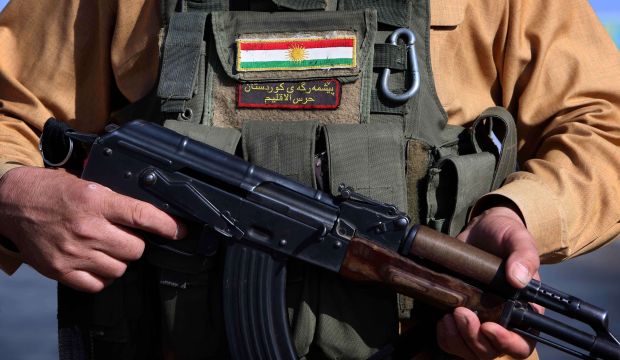
Iraqi Kurdish Peshmerga fighters take position on the front line in Khazer, near the Kurdish checkpoint of Aski kalak, 40 km West of Erbil, the capital of the autonomous Kurdish region of northern Iraq, on August 8, 2014. (AFP/Safin Hamed)
Erbil, Asharq Al-Awsat—Erbil, capital of the semi-autonomous Iraqi Kurdistan Region, was calm on Friday despite reports of Islamic State of Iraq and Syria (ISIS) fighters being less than thirty minutes from the city’s walls, with US President Barack Obama authorizing airstrikes in northern Iraq to halt the Islamists advance.
The US Pentagon confirmed that two FA-18 jets had dropped 500-pound laser-guided bombs on ISIS artillery targeting Kurdish Peshmerga forces in northern Iraq. “As the president made clear, the United States military will continue to take direct action against ISIS when they threaten our personnel and facilities,” Pentagon spokesman Rear Admiral John Kirby said.
However the mood in Erbil, where thousands of Iraqi Christian refugees who have fled ISIS advance have sought refuge, was said to be calm despite the advancing Islamist fighters. The Kurdistan Regional Government (KRG) has already ordered the formation of internal defense forces, calling for volunteers from Kurdistan’s youth to help the Peshmerga forces to preserve security and stability in the region.
Kurdish MP Awaz Hamid, a member of the parliamentary committee for Defense and Internal Security, told Asharq Al-Awsat: “There is no problem in Erbil province, however we have heard propaganda claims that ISIS intends to attack the capital. However this would be impossible. We have a strong defense line in all directions.”
“As for our withdrawal from certain fronts, this is part of a broader strategy. The Peshmerga forces did not withdraw because they were defeated; this was part of a specific military plan. And let me reiterate, Erbil is safe and life is going on as normal,” Hamid added.
Kurdish forces withdrew from the northern city of Qaraqosh, Iraq’s largest Christian-majority town earlier this week, allowing ISIS to make significant territorial gains earlier this week. ISIS was also able to advance into the towns Tal Kayf, Bartella and Karamlesh, according to local reports.
Kurdish security officials have portrayed the withdrawal as a strategic move to consolidate Kurdish territory and forces, amid renewed calls for Washington to provide Kurdish Peshmerga fighters with arms.
“Thousands of young volunteers have signed up to join the new defense forces, and plans are underway to arm and deploy them across the Kurdish provinces to contribute to our defense,” Hamid said.
Hamza Hamid, spokesman for Erbil Governor Nawzad Hadi, reiterated that the situation in the Kurdish capital was under control. Hamid told Asharq Al-Awsat: “The political and security situation in the Kurdistan region, and in Erbil particularly, is fine. The security forces are in control. There is strong support from the Kurdish people towards the Peshmerga forces and other security forces fighting ISIS.”
The Erbil Governor’s spokesman called on the Arab citizens living in the Kurdistan region to cooperate with and join the defense efforts, but also warned of ISIS attempts to infiltrate Kurdish defenses through “sleeper cells.”
“There could be terrorist sleeper cells among the Arabs who have fled to Kurdistan. They could take action to target Kurdish cities and hit the region’s interests. But the general public and security authority are vigilant and are more than capable of protecting against this,” Hamid said.
